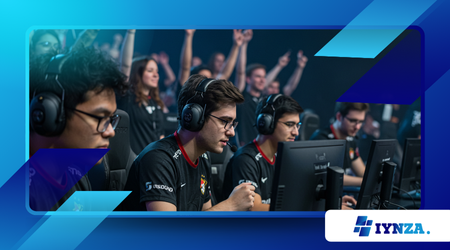What Esports Can Teach You About Leadership, Even If You Don’t Go Pro

What if the next great leader isn’t found in a boardroom—but on a digital battlefield? Competitive gaming has evolved far beyond a casual hobby. It’s now a proving ground for teamwork, decision-making, emotional control, and adaptability.
Anúncios
While not everyone who plays esports will become a professional gamer, the leadership lessons embedded in the world of competitive play are valuable in any field.
In 2025, where collaboration often happens virtually and high-pressure decisions are made in seconds, understanding how esports trains minds for leadership could be the edge you didn’t know you needed.
Whether you’re a student, a manager, or simply someone passionate about personal growth, there’s a lot to learn from this world.
Real-Time Decision Making Under Pressure
Esports players are constantly required to make split-second decisions that affect not just their own performance, but that of their entire team. Whether it’s calling a strategy shift in Valorant or coordinating an ambush in League of Legends, players must evaluate information fast and act even faster.
This is where leadership begins: in taking initiative, assessing evolving situations, and communicating clearly—even under stress.
Great leaders don’t just react. They anticipate, pivot, and keep the team focused when everything’s on the line.
Building Trust and Communication Skills
In esports, there’s no time for miscommunication. Teams that excel are those that trust each other implicitly and speak with precision. Every word matters. Every silence has meaning. And every player knows their role.
These dynamics mirror high-functioning teams in any environment—whether it’s a business, startup, or classroom project.
Leaders in esports learn to listen as much as they speak, adapt their tone to the moment, and create a space where collaboration thrives. They understand that trust isn’t built in victory, but in the way failure is handled together.
Accountability and Role Clarity
Leadership in esports is often about owning your lane—literally and figuratively. When a play fails, there’s no room to shift blame. The replay shows exactly what happened, and everyone learns from it.
This culture of accountability builds strong leaders. It teaches them to reflect honestly, correct course, and never make the same mistake twice. Esports environments also reinforce the importance of clear roles—shotcaller, fragger, support—each crucial, none greater than the whole.
Emotional Intelligence and Composure
One bad play can tilt an entire match. Great esports leaders develop emotional intelligence quickly: they know how to stay calm, support teammates, and recover morale mid-game.
They read the room—whether it’s a LAN event or a Discord call—and respond with empathy or motivation, depending on what’s needed.
Emotional control isn’t just about staying cool under pressure. It’s about setting a tone that others can follow. In esports, this translates into reduced toxicity, faster recovery after losses, and stronger bonds between players. In life, it translates into resilience and influence.
Read also: Why 2025 Feels Like 1995: The Unexpected Revival of 2D Platformers
Adapting to Change and Leading Innovation
The meta changes. Patches roll out. Maps rotate. What worked last season doesn’t work today. Esports players are constantly adapting—and leaders within this space are the ones guiding others through uncertainty.
Being an effective leader means embracing change, staying informed, and inspiring others to do the same. In competitive games, this looks like switching team comps, experimenting with new strategies, and identifying opportunities others haven’t seen yet. In business, it’s innovation.
Esports makes the principle of “iterate quickly and learn faster” more than a saying—it turns it into a habit. And that’s what modern leadership requires.
Those who lead through change don’t wait for instructions—they shape the future by asking better questions, testing bolder solutions, and keeping their team agile. Esports cultivates this mindset daily.
Leading Through Loss: How Setbacks Build Strength
Esports is a world of constant feedback. Sometimes that feedback is harsh—losses, criticism, public performance stats. But it’s also where true leadership is forged.
Players who step up after a loss, who rally the team for the next match, who own their mistakes and still show up fully—that’s leadership in action. Losing with grace and learning fast is often more valuable than winning without awareness.
These moments of adversity are where leaders earn their credibility. And in real-world terms, they become professionals who don’t crumble under pressure—they grow from it.
Mistakes become moments of mastery. Each failure becomes part of a larger success story. Esports reminds us: you lead best when you don’t let setbacks define you.
When leaders frame loss not as shame but as shared opportunity, teams heal faster and rise higher. This lesson, repeated across seasons, stays with them long after the game ends.
Mentoring and Uplifting Others
In competitive games, veterans often take younger players under their wing. They offer guidance, review gameplay footage, and help teammates grow. This informal mentorship develops leaders who aren’t just focused on their own path—but who elevate others as they climb.
In any field, the ability to teach, uplift, and share your process makes you invaluable. Esports leaders understand this instinctively. They win more because they invest in people, not just mechanics.
Mentorship in gaming doesn’t require a formal title. It’s about sharing what you’ve learned and helping others thrive. That generosity is the foundation of lasting leadership.
Mentors shape more than play—they shape mindsets. And in doing so, they build communities that endure beyond seasons, titles, or rankings.
From the Game to the Real World
Leadership is leadership—whether it’s earned in a boardroom or a Best-of-Five final. The habits you build in gaming—ownership, clarity, adaptation, communication, empathy—translate to every aspect of life.
The next time someone doubts the power of gaming, remind them: the best leaders don’t always wear suits. Sometimes, they wear headsets—and they’re already building the future. Those leadership instincts learned through games can grow into boardroom strategies, startup cultures, and high-stakes decisions.
So the next time you log in, remember—you’re not just playing. You’re practicing leadership, one match at a time.
You’re developing decision-making under stress, empathy under pressure, and communication when it counts most. And each match is a chance to level up—not just in rank, but in life.
FAQ: What Esports Can Teach You About Leadership
1. Do esports really help with real-life leadership skills?
Absolutely. The pressure, teamwork, and responsibility mimic high-performance environments in work and life.
2. Can you learn leadership just by playing, or do you need to lead teams?
You learn faster by leading, but even playing within a team teaches valuable skills like communication and accountability.
3. What are some examples of leadership roles in esports?
Shotcaller, strategy lead, or team captain are typical leadership positions in esports teams.
4. Are there training programs to build leadership in gaming?
Yes. Many collegiate and amateur teams now include coaching, reviews, and leadership workshops as part of development.
5. Can esports leadership experience help in job applications?
Definitely. Recruiters value soft skills like communication, adaptability, and emotional intelligence—all present in team gaming.
